Tuesday 3 March 2026, 7.00pm-8.00pm, online

CGDent webinar, Wednesday 25 February 2026, 7pm
This webinar explores practical strategies and evidence-based guidance on using focused-attention and rapport techniques chairside to make a significant difference to patient comfort, confidence and perceived pain.

Speakers:
Aims:
To introduce dental teams to practical communication and focused-attention techniques that reduce patient anxiety and discomfort, support clinical efficiency, and enhance confidence and wellbeing for both patients and practitioners.
Objectives:
During this webinar, you will be able to:
Learning outcomes:
After completing this webinar, you will gain an understanding of:
CPD approx 45 minutes
GDC development outcomes: A C D
This webinar is hosted by the College of General Dentistry and powered by our CPD delivery partner, ProDental CPD – register below.
It is free to view live for all dental professionals, and College members also have free access to the recorded webinar and can claim CPD hours for free. A £20 fee will apply for non-members who wish to claim CPD.
Membership of the College of General Dentistry is open to all registered dental professionals. Membership is available from £135 for dentists, £45 for dental nurses and £91 for other registered dental professionals. The full list of CGDent membership rates is here
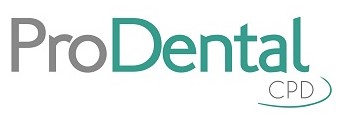
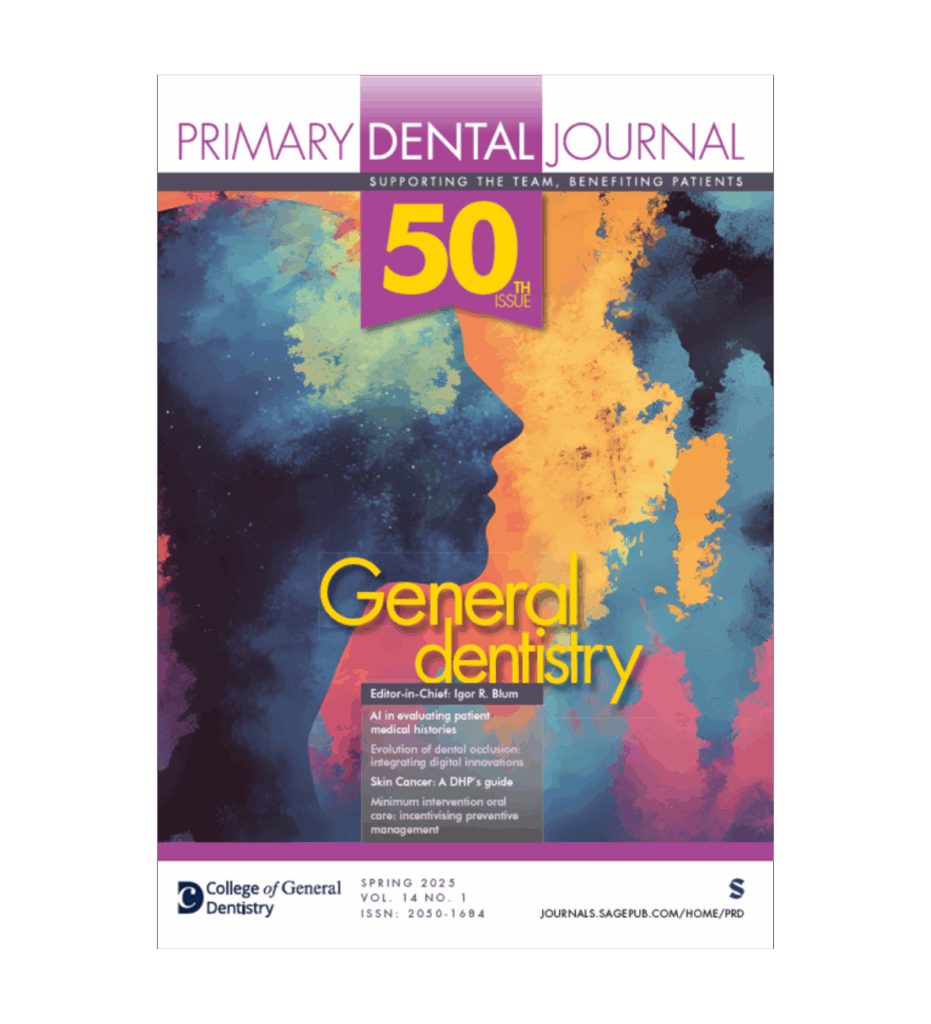
Jodie Nelson, John Duthie and Elvira Lang-Anderson co-authored a paper in the general dentistry 50th issue of Primary Dental Journal, entitled ‘Procedural hypnosis: a powerful tool for reducing stress, anxiety and pain in clinical dental care‘, published in May 2025.
CGDent Midlands Study Club, Thursday 12 February 2026, 6pm-8pm, Wolverhampton
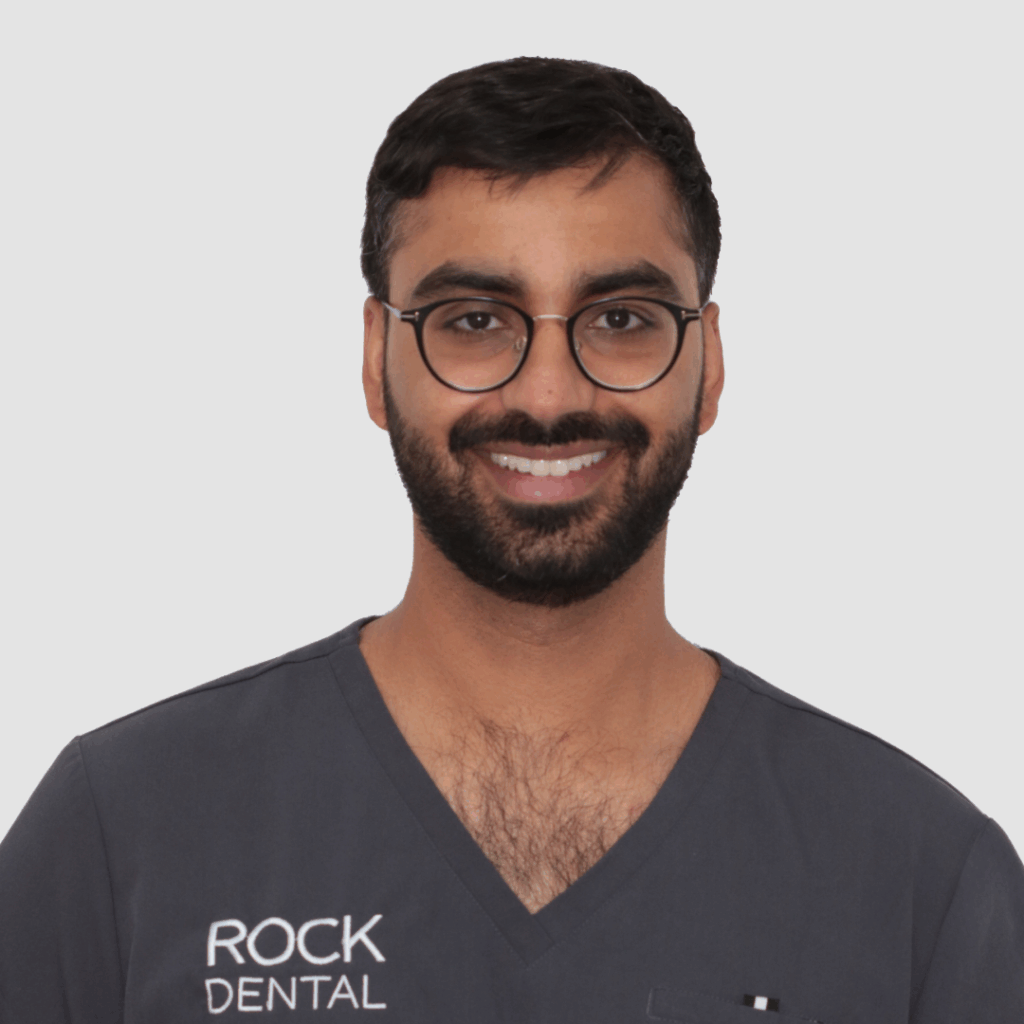
This CGDent Midlands Study Club was organised in association with Rock Dental, a specialist referral practice.
College members and non-members were invited to join an interactive case discussion evening with the team at Rock Dental, which comprises a mixture of general dentists and speciality dentists.
The first hour focused on:
The second hour was case based discussions.
Limited number of places were available.
Speakers:

Dr Hardeep Sahota
Dr Hardeep Sahota qualified from the University of Birmingham in 2015 before completing specialist training in Periodontology at the Eastman Dental Institute, University College London, in 2022. He holds an MClinDent in Periodontology (Distinction) and MPerio RCSEd.
Venue:
Rock Dental,
273 Tettenhall Road,
Wolverhampton,
WV6 0DE
Fee:
Current members of the College: Free
Non-members: £20
2 hours verifiable CPD, GDC development outcomes: A, C
If you have any questions or queries, please contact [email protected]
Once you have submitted the registration form by clicking on the button above, please also email [email protected] with the name and address of your current practice.
The new issue of the Primary Dental Journal, ‘Implant dentistry (part two)’, is now available to view online.
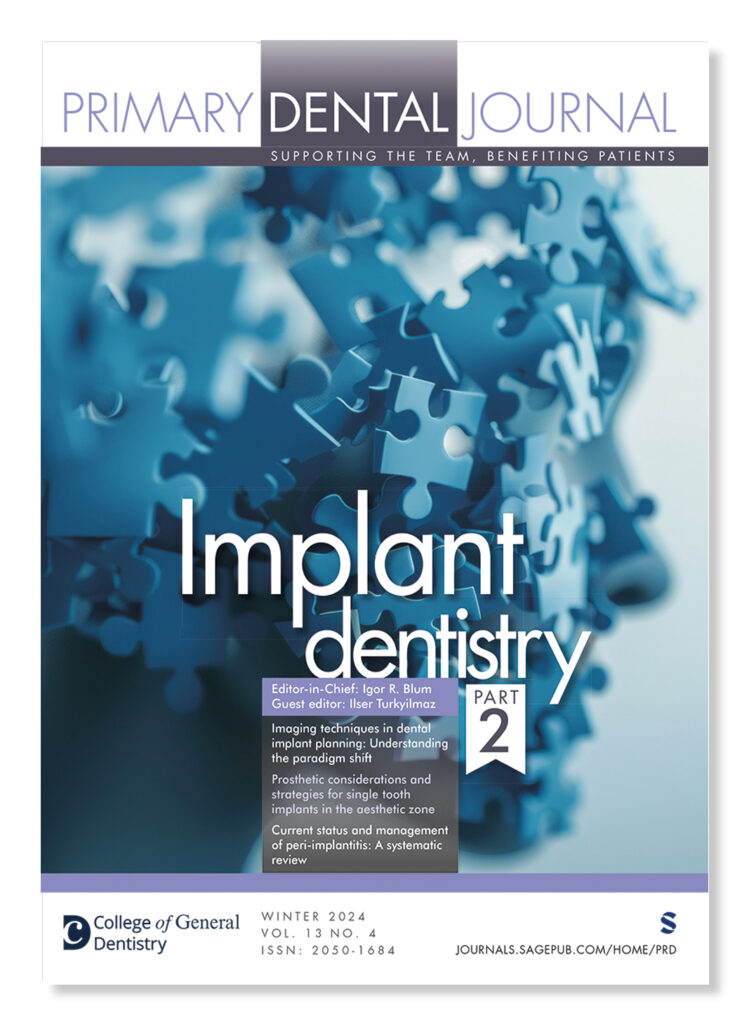
While Implant Dentistry (part one) covered the roles of dental team members in managing implant patients within dental primary care, this part 2 issue focusses on clinical aspects of implant dentistry, including complications and adverse events, and recent technological advancements in the field, providing strategies for dental professionals.
The issue’s Guest Editor is Professor Ilser Turkyilmaz, Associate Dean of Digital Innovation, Professor and Chair at USA Case Western Reserve University’s School of Dental Medicine. Professor Turkyilmaz explains the thinking behind the collection of topics in the part 2 issue:
“As we continue to advance in the field of implant dentistry, clinicians face an ongoing challenge to adopt and incorporate modern tools and materials that elevate the quality of patient care while simultaneously reducing the complexity of their workflows. Our goal with this issue is to enrich the knowledge base of both new and experienced practitioners, empowering them to achieve optimal patient outcomes…in the dynamic field of implant dentistry.”
Papers included in this issue cover a range of digital and analogue workflows, with the core emphasis on the importance of thorough treatment planning, reinforced by advanced imaging techniques. A full list is below.
Full online access to the majority of articles is reserved for College of General Dentistry members and Primary Dental Journal subscribers, who can also expect their printed copies to arrive around the end of January. New joiners wishing to receive a copy of this issue can let us know by emailing [email protected]
For non-members / non-subscribers, at least one paper in each issue is made available online free of charge, with all other articles available to purchase via the links below.
An annual print subscription to the PDJ is included with membership of the College, which also includes online access to over 1,500 current and past articles in the PDJ Library and a range of other benefits.
On behalf of the College, the PDJ editorial team would like to express its gratitude to all the authors and peer reviewers who have contributed to this issue.
ISSUE CONTENTS:
CGDent members can view full articles by logging in via the yellow button below, then clicking ‘Access the PDJ Library’:
An earlier version of this article was published on 26 December 2024. The next issue of the journal, General Dentistry, is due out in Spring 2025.
Patricia Thomson FCGDent, Council representative for North and West Scotland, reviews the College’s recent annual study day in Glasgow.
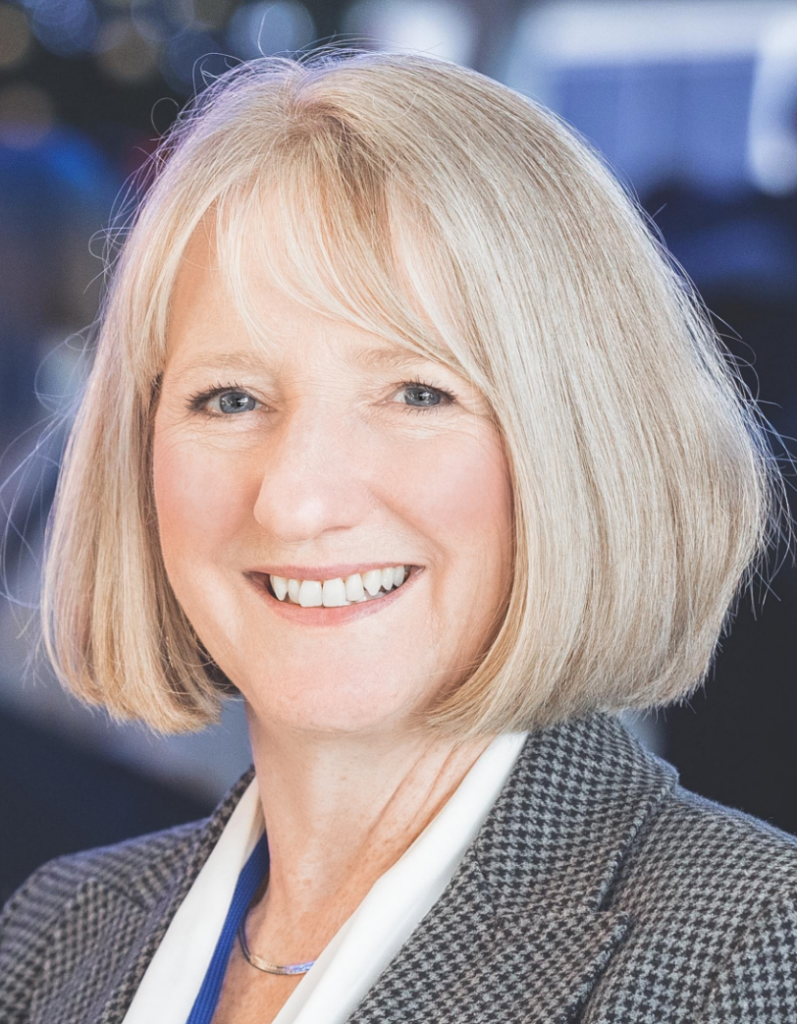
The 6 December 2024 witnessed the most recent gathering of our dental community for the College’s annual Study Day in Scotland, at the Science Centre, Glasgow. This was the fourteenth year that we have held the event at this venue due to its convenient location and the superb facilities, including an Imax Theatre and an outstanding AV team. After registration, breakfast rolls and coffee, and an initial inspection of the sponsors’ stands, delegates entered the Imax Theatre at 9am for the start of the programme.

Once again the event was fully subscribed, with both sponsorship and delegate spaces sold out well in advance, and we had an in-person attendance of around 360 plus additional delegates who joined virtually. We were delighted to welcome back a core of GDPs and trade sponsors who are loyal supporters of the day, but we also welcomed many new faces, including those who had travelled from outside of Scotland.
It was a pleasure to host Dr Roshni Karia MCGDent, the recently appointed President of the College, as well as Professor Aileen Bell (Dean of Glasgow Dental School), Dr Andrew Paterson (Education Lead for Restorative Dentistry at Glasgow Dental School), and representatives of organisations including the BDA, GDC, National Services Scotland, Practitioner Services (Dental), NHS Education Scotland (NES), MDDUS, DDU/MDU, and LDCs from Greater Glasgow and Clyde Health Board and Lanarkshire Health Board.
This year we were also joined by several charities: Bridge to Aid; Maldent; GOHISS (Glasgow Oral Health Improvement Student Society); Smileawi (2019 winner of the Dean’s Award given by the former Faculty of General Dental Practice); and the Canmore Trust (whose CEO, Professor John Gibson, was awarded the College Medal earlier in the year). All had a very successful day, networking with the dental trade and our community of practice.

Glasgow Dental School also enabled its final year BDS students to attend, and they were joined by a number of undergraduates from Dundee Dental School.
Unfortunately, Government fiscal restrictions prevented NES funding the attendance of Vocational Dental Practitioners this year, but despite that, a group of trainers facilitated the attendance of their own VDPs, recognising the value to early career colleagues of joining the wider professional community and attending face-to-face CPD events.
Our speakers for the day, all Fellows of the College, were: Dr Catherine Rutland, Clinical Director at Simply Health and Denplan, who leads a team providing clinical governance advice to all areas of the clinical group; Dr Andrew Chandrapal, practice owner and educator with a special interest in aesthetic dentistry, composite bonding and complex rehabilitation; and Dr Wendy Thompson, a microbiologist and GDP in Cumbria who is Chair of the FDI World Dental Federation Task Team on Preventing AMR and Infection.
The lecture programme commenced with tributes to the late Dr Louis MacKenzie FCGDent, delivered in the first instance by Professor Gibson, whose own personal tragedy brought about the establishment of the Canmore Trust, which raises awareness of suicide prevention and postvention and works with individuals touched by suicide.
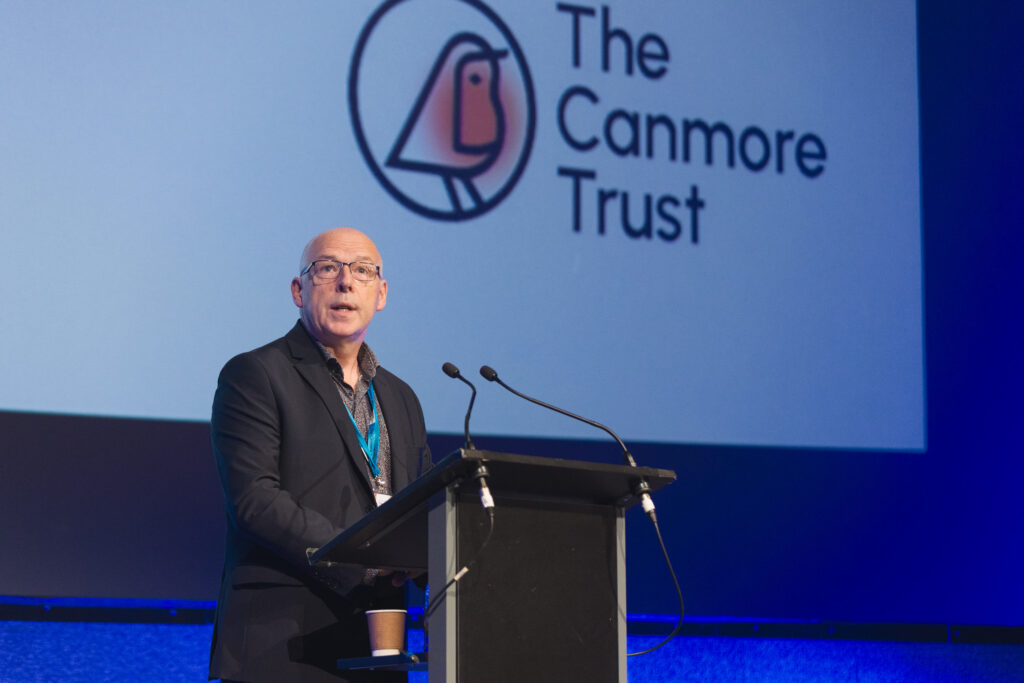
We had engaged Louis as our main speaker eighteen months previously, and he was to present on the topic of anterior and posterior composites. On initially planning the day, Louis had suggested that Dr Catherine Rutland would be an ideal complementary speaker. The devastating loss of Louis before Christmas 2023 resulted in the painful dilemma of how to move forward with the Scotland Study Day 2024. After a period of reflection, Catherine agreed that she was willing to present at the event. It was felt that we should approach Andrew Chandrapal as an appropriate replacement speaker on the topic of composite restorations. We are immensely grateful to both of them, as they had been close colleagues and friends of Louis, and both delivered the most touching tributes to him that morning, despite the emotional difficulty that this involved.
All of these tributes ensured that Louis was not forgotten, and was an enduring presence throughout the day.
After our introductions, Catherine delivered a very thought provoking lecture on the “Ethics of Aesthetics”. This foray into the world of consumer-driven dentistry, and the perils of dentists engaging in social media without regard for professional ethics, was a timely reminder of the pitfalls that can be encountered, and made those of us of mature years relieved that we have the excuse of age not to engage in such activity.

After our mid-morning break, which involved networking, refreshments and a visit to the trade stands, Andrew Chandrapal spoke on the topic of anterior composites. His lecture was delivered in the format of “top tips”, and covered such subjects as the use of enamel and dentine composites, replication of tooth anatomy, shade selection, appropriate matrices and wedges, and tips on finishing.
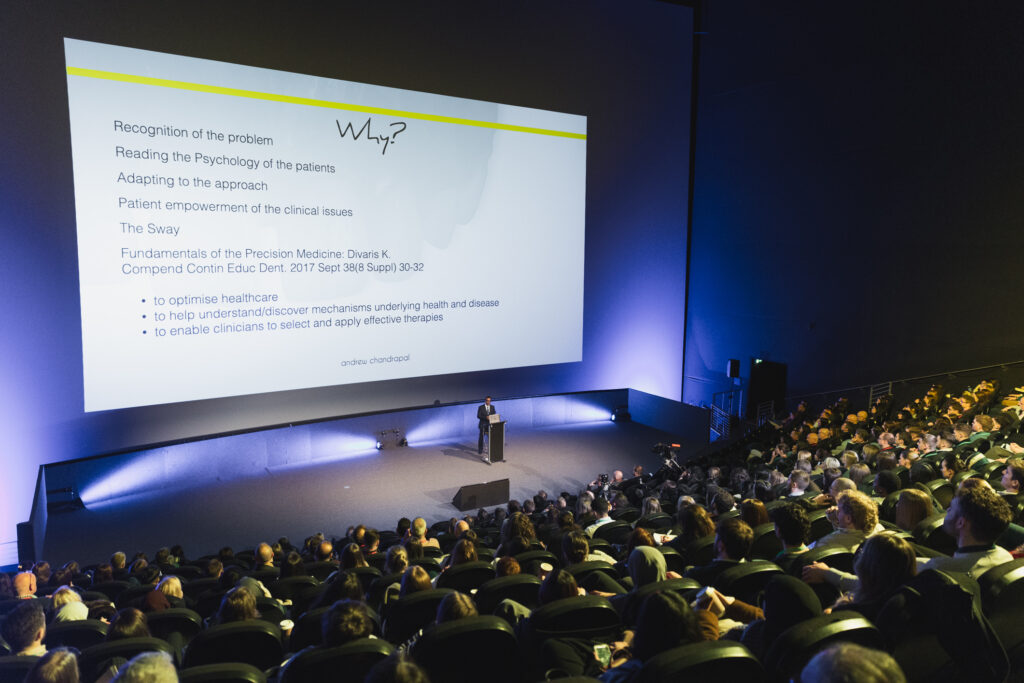
Following this, the delegates retired for a sit-down lunch with an opportunity for further networking and professional fellowship. Old acquaintances were renewed, and new ones established.
After lunch, the final year students reconvened in another lecture theatre for the delivery of their own programme, initially addressed by Dr Karia, followed by representatives of three of our sponsors, Scottish Dental Care Group, Martin Aitken Accountants and MDDUS. On their way to the theatre, the students took full advantage of privileged access to the Science Centre’s fun exhibits of wonky mirrors and optical illusion floors, proving that they are still students!


Meanwhile, in the main lecture theatre, Andrew continued with his afternoon lecture, providing top tips on posterior composites and advice on establishing fissure depth and reproducing accurate occlusal morphology and anatomy. He also imparted excellent tips on rubber dam placement, sectional matrices and wedges.
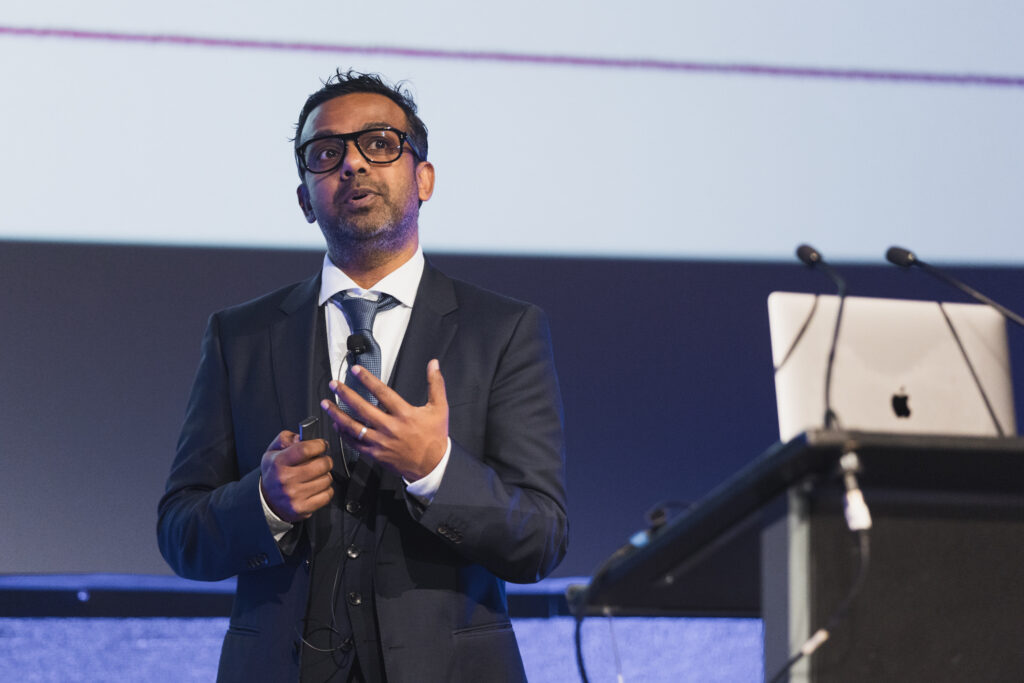
The afternoon break allowed the students to re-join the main delegate body, and all to enjoy further refreshments and chat, and a final opportunity to interact with the dental trade.
Dr Wendy Thompson, our third speaker of the day, delivered the Caldwell Memorial Lecture on the subject of “Antibiotic Sustainability”. We were all extremely relieved when Wendy did not force the delegates to take part in an aerobics session that she was threatening, and allowed us to sit down and be thoroughly convinced that antibiotics do not cure toothache, along with a very sobering message on the effects of antimicrobial resistance delivered through video by a devastatingly affected patient.
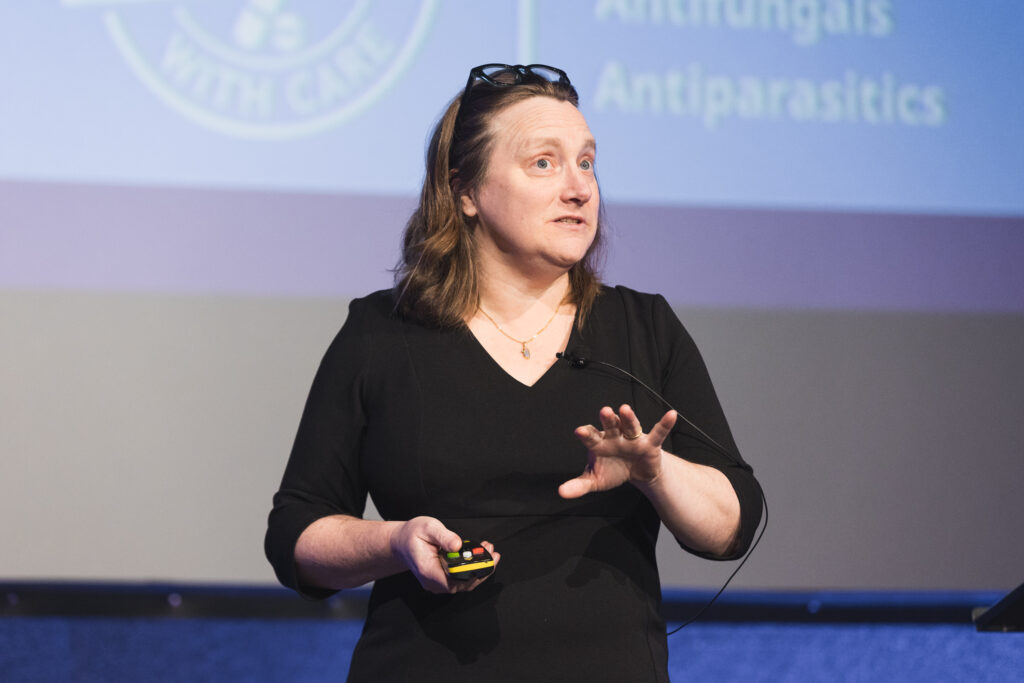
After the rigours of the day we all retired to the much-deserved drinks reception, observing the rivulets of rain on the outside of the triple-height windows which signalled the arrival of Storm Darragh, proving once again that we have a lot of weather in Glasgow. There was also opportunity for the more mature delegates to sample the wonky mirrors and sloping floors of the exhibits, sensibly, before they had even touched a glass of wine.

The day is structured to provide six hours of high quality CPD, the opportunity for our community of practice to gather with ample time for professional networking, and interaction with the trade and other stakeholders.
We specifically thank the local members of our profession who give so much time and effort on an altruistic basis for the benefit of our professional community, and ultimately for the benefit of patients. We could not deliver this day without them.
We would like to acknowledge our gratitude to the various members of the trade whose sponsorship and loyalty enables us to deliver an event on this scale and subsidises the cost of attendance for delegates.
Specifically, our Platinum Sponsor was Scottish Dental Care Group, and our Gold Sponsors were Nexus Lab, MDDUS, Martin Aitken Accountants, the BDA, Clyde Munro, the Scottish Centre for Excellence in Dentistry and Strictly Confidental.
Our Silver Sponsors were Acteon, Align Technology, the DDU, Denplan, GC UK, the GDC, Haleon, Greater Glasgow and Clyde LDC, Kettenbach Dental, NHS National Services Scotland, Optident, Patient Plan Direct, Real Good Dental, the Royal Bank of Scotland, Septodont, Thorntons and Wrights.
This year’s event will take place on Friday 5 December 2025 and the programme for the day is already well advanced. All College members receive a hefty fee discount, and we strongly encourage you to come wherever you’re based in the UK (or elsewhere). There’s no better way to kick off the Christmas season and you’re guaranteed a warm welcome – hope to see you there!

CGDent on-demand webinar, Wednesday 11 February 2026
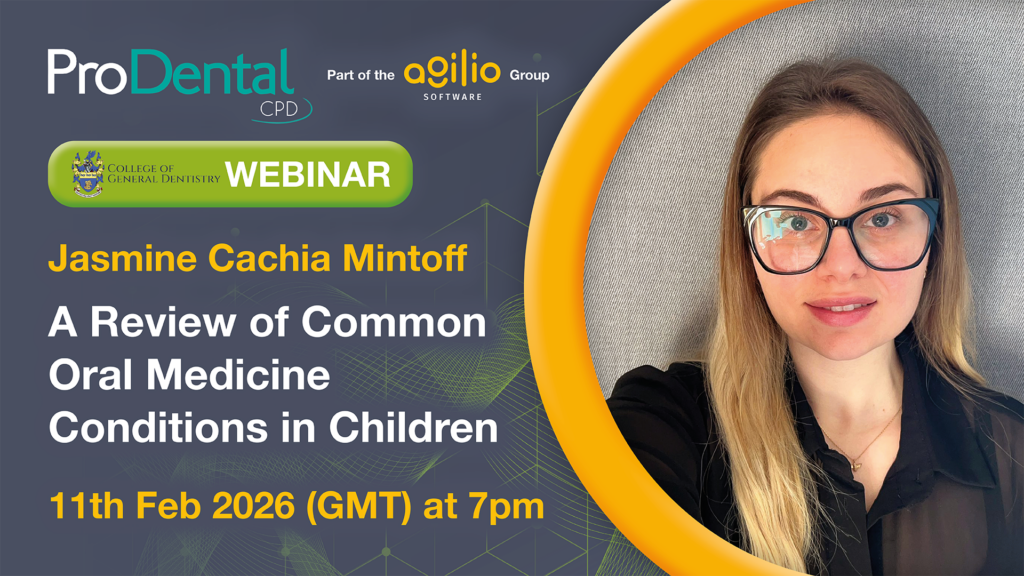
GDPs are the first line for seeing and diagnosing conditions in the oral cavities, which are common in children and adolescents. So, it is important that dental practitioners are aware of the different management options available and when it is appropriate to refer.
This CGDent webinar, aims to provide you with information on the correct, simple management options for common conditions, and a guideline of when and where to refer for more complex issues; ensuring paediatric patients receive the best possible care.
Speaker:
Aims:
Provide an overview of the common oral medicine conditions seen in children, their diagnosis and their management, including management which can be initiated by the general dental practitioner.
Objectives:
During this webinar learners you will be able to:
Learning outcomes:
After completing this webinar you will gain an understanding of:
CPD approx 40 minutes
This webinar is hosted by the College of General Dentistry and powered by our CPD delivery partner, ProDental CPD – watch recording below.
It is free to view live for all dental professionals, and College members also have free access to the recorded webinar and can claim CPD hours for free. A £20 fee will apply for non-members who wish to claim CPD.
Membership of the College of General Dentistry is open to all registered dental professionals. Membership is available from £135 for dentists, £45 for dental nurses and £91 for other registered dental professionals. The full list of CGDent membership rates is here

Sign up to the College’s monthly newsletter
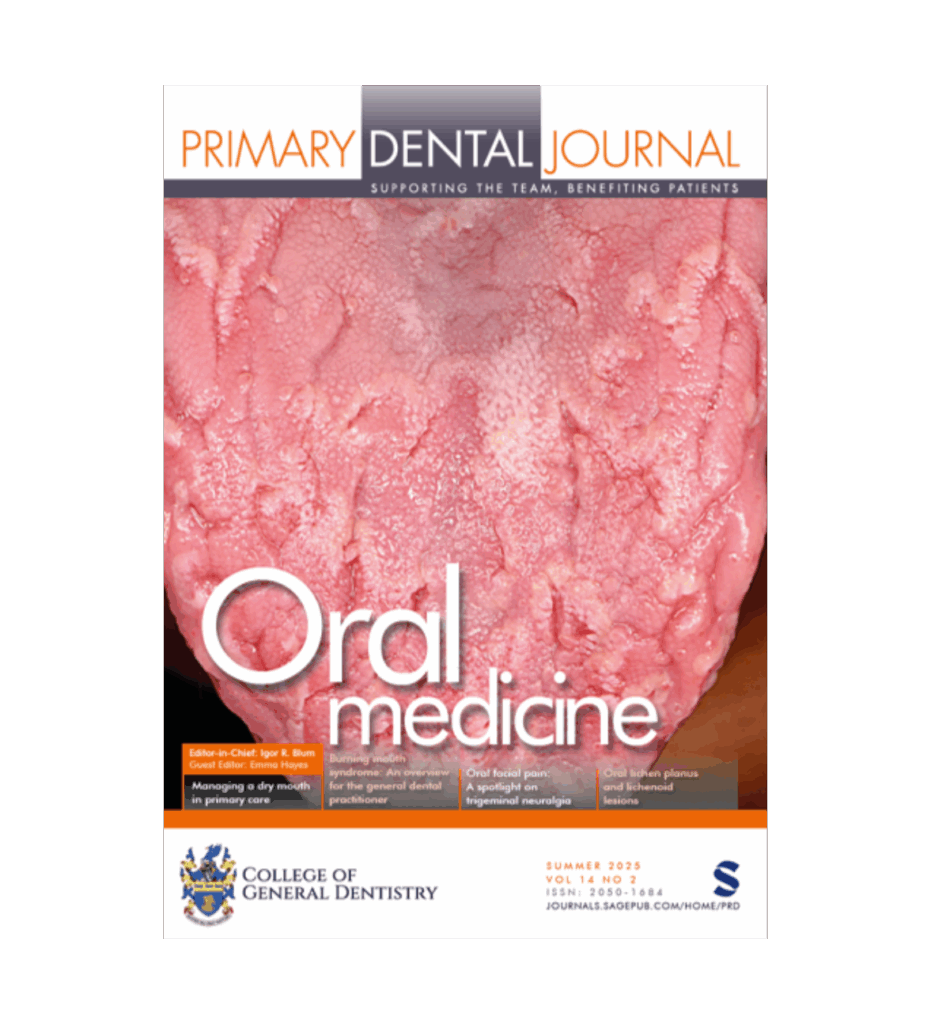
Jasmine Cachia Mintoff co-authored a paper in the oral medicine issue of Primary Dental Journal, entitled ‘A review of common oral medicine conditions in children‘, published in September 2025.
Fatimah Jawaid FCGDent, a general dental practitioner based in Birmingham, describes her professional journey and how her experience led to Fellowship of the College.
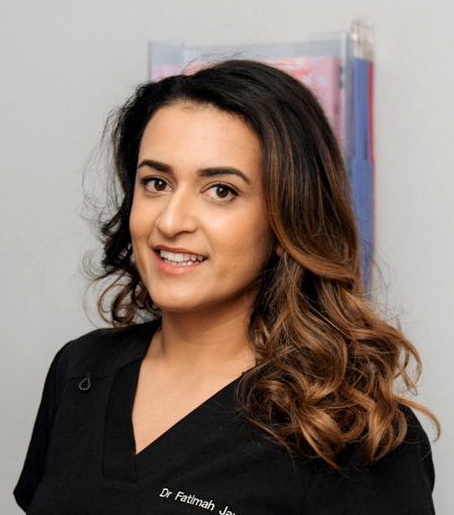
Q. Can you tell us about yourself and your career?
A. I am a dedicated general dentist working in Edgbaston, Birmingham. I graduated from the University of Birmingham in 2012 with Distinction in Clinical Dentistry. I completed my FD year and went on to complete a further DCT year in Restorative Dentistry at Barts Dental Hospital, London. After this, I settled into an associate role in Birmingham, completed my MSc in Fixed and Removable Prosthodontics, PGCert in Dental Education and have recently completed my Implant Training. I am currently in the process of becoming a principal dentist and look forward to the new challenges ahead!
Outside of work, my main job is being mummy to Liyana (aged 5) and Layth (aged 3). We live in Moseley, Birmingham, with my husband, Sadiq, who is a currently a maxillofacial registrar. I enjoy going to the gym, travelling and exploring new cultures with my tribe in tow!
Q. Why did you decide to apply for Fellowship of the College?
A. I obtained College Fellowship (FCGDent) through the ‘Fellowship by experience’ route. I felt this achievement allowed me to demonstrate high standards in primary care dentistry and reflect the commitment I had put into my career since graduation. Upon researching the criteria, I realised that I was able to meet the domains and successfully achieve Fellowship.
Q. Which three of the five fellowship domains does your professional experience meet?
A. The three domains that I used for my Fellowship application were Clinical; Teaching, Learning & Assessment; and Publications & Research.
My Masters in Fixed and Removable Prosthodontics from Kings College London (2019) provided me with the evidence for the Clinical Domain as it had more than the required credits.
The final year dissertation allowed me to the achieve the Publications & Research Domain.
For the Teaching, Learning & Assessment Domain, I used my PGCert in Dental Education and I demonstrated that I had at least four years’ experience in a role as an Educational Supervisor for Foundation Dentists.
Q. What would you say to others who are considering applying for Fellowship through the experience route?
A. Still considering myself as a young dentist, I am excited to see the opportunities and ideas that are being undertaken within the College and how they will impact my future practising career.
Having completed several challenging postgraduate courses, the recognition I received from the College, and being able to call myself a Fellow of the College at 31, felt very rewarding indeed!
Dental professionals can apply for admission to Fellowship of the College – the mark of accomplishment in dentistry – by two routes: Fellowship by Experience and Fellowship by Equivalence.
To apply for Fellowship by the Fellowship by Experience route, you will need to submit a CV and detailed evidence showing how you meet the eligibility criteria for three of the five fellowship domains. The domains are:
We have “Gateway” criteria which require less evidence and will be processed more quickly, if you meet all these requirements.
Full details about routes to Fellowship and how to apply are available here.
Thursday 5 February 2026, 6-9pm, London

The Livery Hall, Cutlers’ Hall, Warwick Lane, London EC4M 7BR
The College of General Dentistry 2026 Fellows’ Winter Reception took place on the evening of Thursday 5 February in the historic Cutlers’ Hall in London.
The event was an opportunity to network with peers over drinks and canapés, as well as to meet College Trustees and members of the College Council and Faculty Boards.
After a welcome by the Chair of the College and an address by the President, the College Medal awarded in June 2025 to Kevin Lewis FCGDent was presented to his son, Nick Lewis FCGDent (a Foundation Member of the College and former Course Director of the FGDP[UK] Diploma in Restorative Dentistry).
This was followed by the admission of new Fellows and Associate Fellows.
Formal business attire was recommended
Ticketing
This event is open to all members of the College’s Fellowship community, i.e. Associate Fellows and Fellows of the College, as well as members of the College’s Board of Trustees, Council and Faculty Boards.
Information on eligibility for Fellowship (FCGDent) and Associate Fellowship (AssocFCGDent) is available here
If booked early, tickets are free of charge to presenting Fellows (i.e. new Fellows, and any College Fellow who has neither been ceremonially admitted as a Fellow at a previous College Fellows’ Reception nor had their fellowship of the former FGDP(UK) [if applicable] conferred at a Diplomates’ Day).
If booked early, tickets are also free of charge to presenting Associate Fellows (i.e. any Associate Fellow who did not attend the most recent Fellows’ Summer Reception on 13 June 2025 – regardless of whether they have attended any previous Fellows’ Receptions).
Once all complimentary tickets have been taken, tickets for presenting Fellows and presenting Associate Fellows will cost £20.
For all other attendees, tickets are £55 if booked early.
All those eligible to attend may bring up to one guest should they wish. Newly admitting Fellows may wish to bring a partner or family member, other members may wish to bring a colleague (in any dental team role, including trainees).
All guest tickets are charged at £55 if booked early, regardless of the rate paid for the eligible member’s own ticket, and guest tickets must be booked at the same time as the eligible member’s ticket.
Once all early bird tickets have been sold, tickets for all attendees other than presenting Fellows and Associate Fellows will cost £65.
Please note that the following events will also be taking place in and around the same venue earlier in the day:
Thursday 5 February 2026, 6-9pm, London
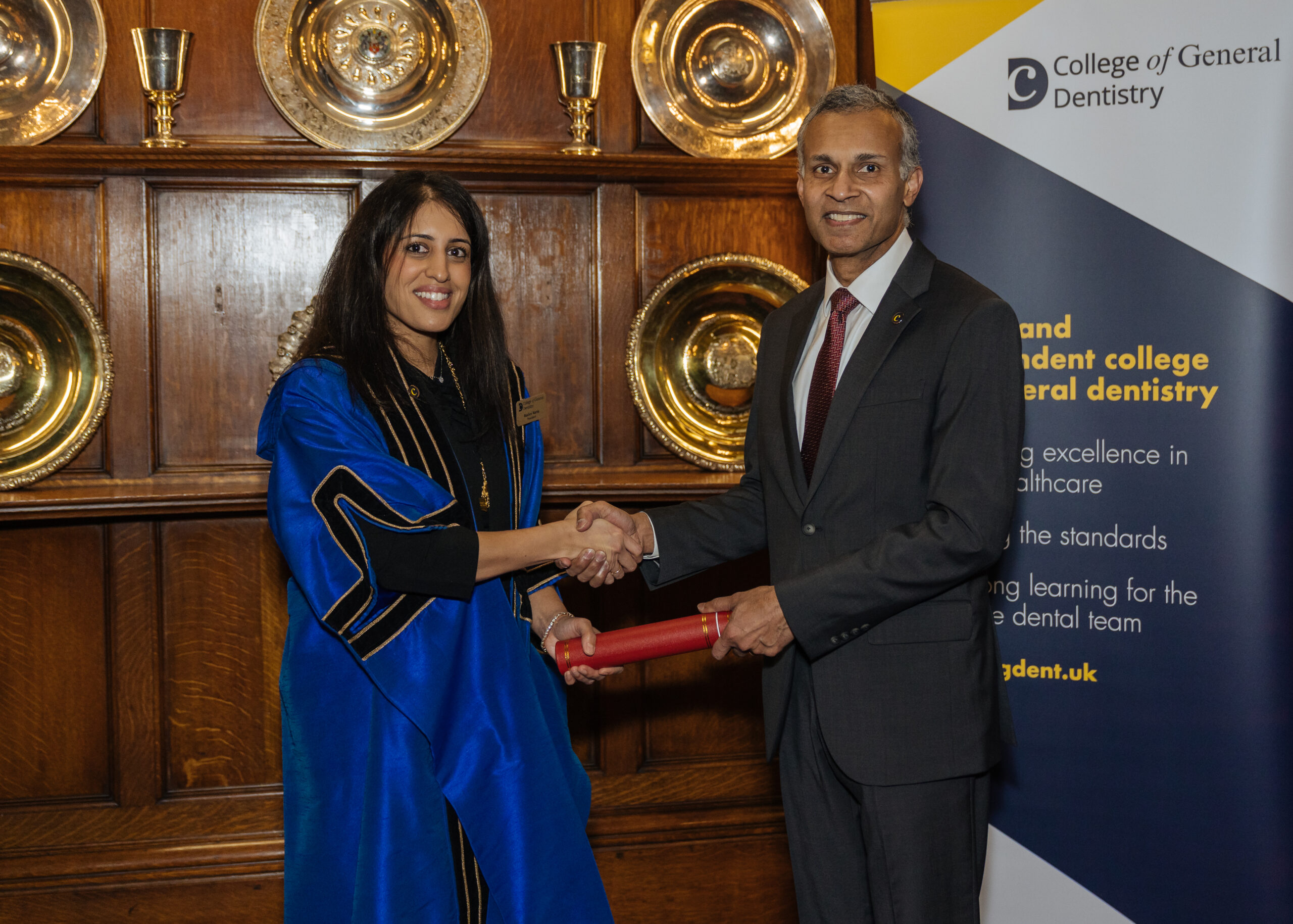
Professor Sreenivas Koka FCGDent being ceremonially admitted into Fellowship by College President Dr Roshni Karia
The Livery Hall, Cutlers’ Hall, Warwick Lane, London EC4M 7BR
Associate Fellows and Fellows of the College were invited to be presented for ceremonial admission into our Fellowship community by the President of the College, Dr Roshni Karia.
The presentations were incorporated within the Fellows’ Winter Reception, and took place in front of gathered Fellows and Associate Fellows of the College.
This is only the second opportunity for Associate Fellows to be presented, and all Associate Fellows attending the Fellows’ Winter Reception will be ceremonially admitted and could attend the event free of charge.
New Fellows, and any College Fellow attending the Fellows’ Winter Reception who has neither been ceremonially admitted at a previous College Fellows’ Reception nor had their fellowship of the former FGDP(UK) conferred at a Diplomates’ Day could be ceremonially admitted and could likewise attend the reception without charge if they book early.
Each presenting Fellow or Associate Fellow may bring one guest. Guest tickets are charged at £55 if booked early and £65 thereafter. Guest tickets must be booked at the same time as the presenting member’s ticket.
Photographs of each presenting Fellow and Associate Fellow being ceremonially admitted by the President will be made available shortly afterwards to download free of charge.
The Fellows’ Winter Reception is an opportunity for dental professionals to network with their peers, as well as to meet College Trustees and members of the College Council and Faculty Boards.
Associate Fellowship of the College recognises enhanced knowledge and skills, and demonstrates commitment to lifelong learning and the highest levels of patient care. Associate Fellows are senior members of the College who are advancing their journey towards Fellowship. Recognised as Enhanced Practitioners on the College’s Career Pathway, their professional standing is marked with the use of the postnominals ‘AssocFCGDent’.
Associate Fellowship is open to those holding an eligible Postgraduate Diploma or Masters level qualification in a relevant subject or those who successfully complete an application by portfolio.
Fellowship is the most senior membership of the College; a mark of distinction across clinical and professional domains, and of significant commitment to the art and science of dentistry through professional development, reflective practice and diligence in upholding the highest standards of clinical care. Recognised as Accomplished Practitioners on the College’s Career Pathway, the professional standing of College Fellows is signified through the use of the postnominals ‘FCGDent’.
Admittance to Fellowship can be achieved by experience or by equivalence.
Anyone who successfully completed an application to join the College as an Associate Fellow or Fellow (or who upgraded their pre-existing membership to become an Associate Fellow or Fellow) by 30 November 2025 will have the opportunity to be ceremonially admitted at the Fellows’ Winter Reception and can therefore book their reception ticket at no charge.
Places for ceremonial admission are subject to availability of tickets for the event, so once applications are approved, early registration is advised. Anyone unable to be accommodated, or whose application or upgrade completed later than 30 November 2025, will be given priority for registration at the next available Fellows’ Reception, which will be in Summer 2026.
Please note that the following events will also be taking place in and around the same venue earlier in the day:
Nominations are now open for elections to six seats on the College Council, and all Full Members, Associate Fellows and Fellows of the College are invited to nominate themselves as candidates.

Nominations are sought for the following seats:
Candidates for regional seats must live or work within that region, and be registered with that region with CGDent. Candidates for the National seat must live or work in the UK, and have a registered UK address with CGDent. Candidates for the Overseas seat must practice dentistry wholly outside the UK, and have a registered overseas address with CGDent.
All eligible members as at 16 January 2025 have been emailed a link to the nominations website by the College’s election services provider, Mi-Voice. If you are interested in standing for election, you will need to complete the nomination process via that link, where you will be asked for further information, the names of two supporting members, and to submit an election statement.
Members may stand simultaneously for both the National seat and the regional seat for which they are eligible (if applicable) by submitting a separate nomination form for each seat.
Further information on the role, nomination requirements and the election timetable can be found via the button below.
The deadline for receipt of nominations is Sunday 16 February 2025.
If you think you might like to put yourself forward as a candidate and would like further information before deciding, we would be pleased to have a confidential discussion and to answer any questions you may have about the role and the process. Please get in touch via [email protected]